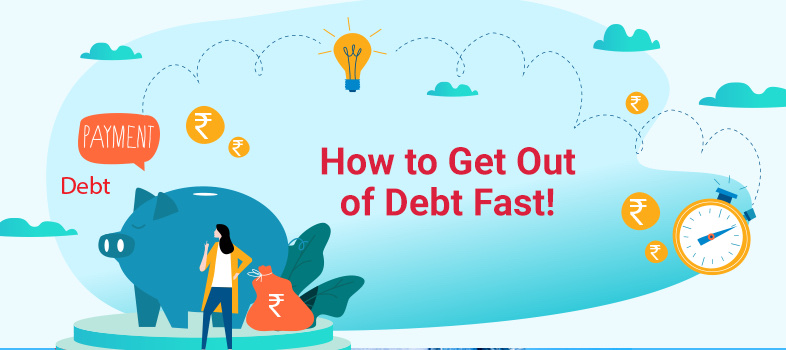Making your own debt-reduction strategy is indeed doable. Even with a modest salary, you can eliminate your debt quickly by making a few significant lifestyle changes.
It’s difficult to get out of debt. Even just making the minimal monthly payments on your credit card can be difficult at times, let alone keeping up with monthly obligations and saving money for a rainy day. Thankfully, there are numerous approaches to debt relief that won’t make you miserable. It necessitates dedication, preparation, and strict self-control. Fortunately, when you develop healthier spending habits, it becomes simpler over time.
Take back control of your life right away. There are several strategies to quickly pay off debt.
Organize Your Bills & Debts
Make a note of all of your present debts and loans before coming up with a plan for paying them off. Go through the last six months’ worth of bank and credit card statements, and make a list of all recurring debts, bills, and other fixed costs.
The monthly payment, overall debt, interest rate, period, and any other pertinent information should all be included in your list. For instance, you should record whether any loans are currently being deferred or are part of a unique repayment plan.
Check your credit report to see all active loans and lines of credit to make sure you haven’t overlooked anything.
Stop Borrowing
Stopping any borrowing is the first and most crucial step towards debt relief. No more borrowing money, using credit cards, or accruing additional debt.
The most fundamental adjustment that needs to be made is changing your perspective on money and debt. You need to be aware of the true cost of using a credit card and taking out new loans in order to prevent further debt accumulation.
Make the decision to live off of cash while you make your improvements. You’re still in the early stages, so don’t worry about debt consolidation or balance transfers just yet. Prior to having a plan and understanding your circumstance, you shouldn’t trade one type of debt for another.
Increase Your Income
You can only cut so many corners when it comes to saving money. Your next objective should be to improve your revenue following the creation of a budget and the elimination of some expenses. Look for methods that your abilities could help you generate additional money on the side, if a raise or promotion at your current employment doesn’t seem feasible.
Change your tax withholding at work as well. If you consistently get a tax refund, you might be having too much money withheld, which could be used to temporarily reduce your debt.
Familiarise Yourself with Debt Avalanche Strategy
When you have extra cash to pay off your debts, you need to choose the best way to put it to use. The debt avalanche approach is frequently referred to as the most useful tool for many people.
Making a list of all of your current bills and ranking them from highest to lowest in terms of interest rate is how the debt avalanche approach works. You continue to pay the minimum amount due on each account and apply any additional funds you have to the account with the greatest interest rate.
After paying off your debt with the highest interest rate, switch to the account with the next-highest interest rate. Continue doing this until you have paid off all of your debt.
You will pay off your bills more quickly and ultimately save more money in interest if you pay off the obligation with the highest interest rate first.
Consider Consolidating Your Debt
Consolidating your debt might hasten the repayment of high-interest loans. Debt consolidation is the process of paying off your other debts by taking out a personal loan from a bank or another trustworthy lender. Moving future, you will only have one debt to manage and one monthly payment.
Additionally, you might be eligible for a debt consolidation loan at a lower interest rate than you were paying on your previous loans if you have good credit or a family member or friend who has good credit and is prepared to co-sign for you. This can assist you in paying off your debt more quickly and ultimately save you money.
At Last, Track Your Progress
It takes time to pay off debt, and it’s simple to lose motivation along the route. Tracking your progress at regular intervals, such as weekly or monthly check-ins, will help you stay focused.
Maintaining a spreadsheet or a visual progress tracker will serve as a reminder of your accomplishments and the objectives you still have left to complete.

